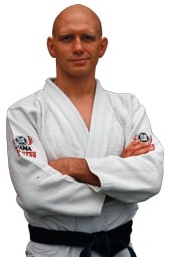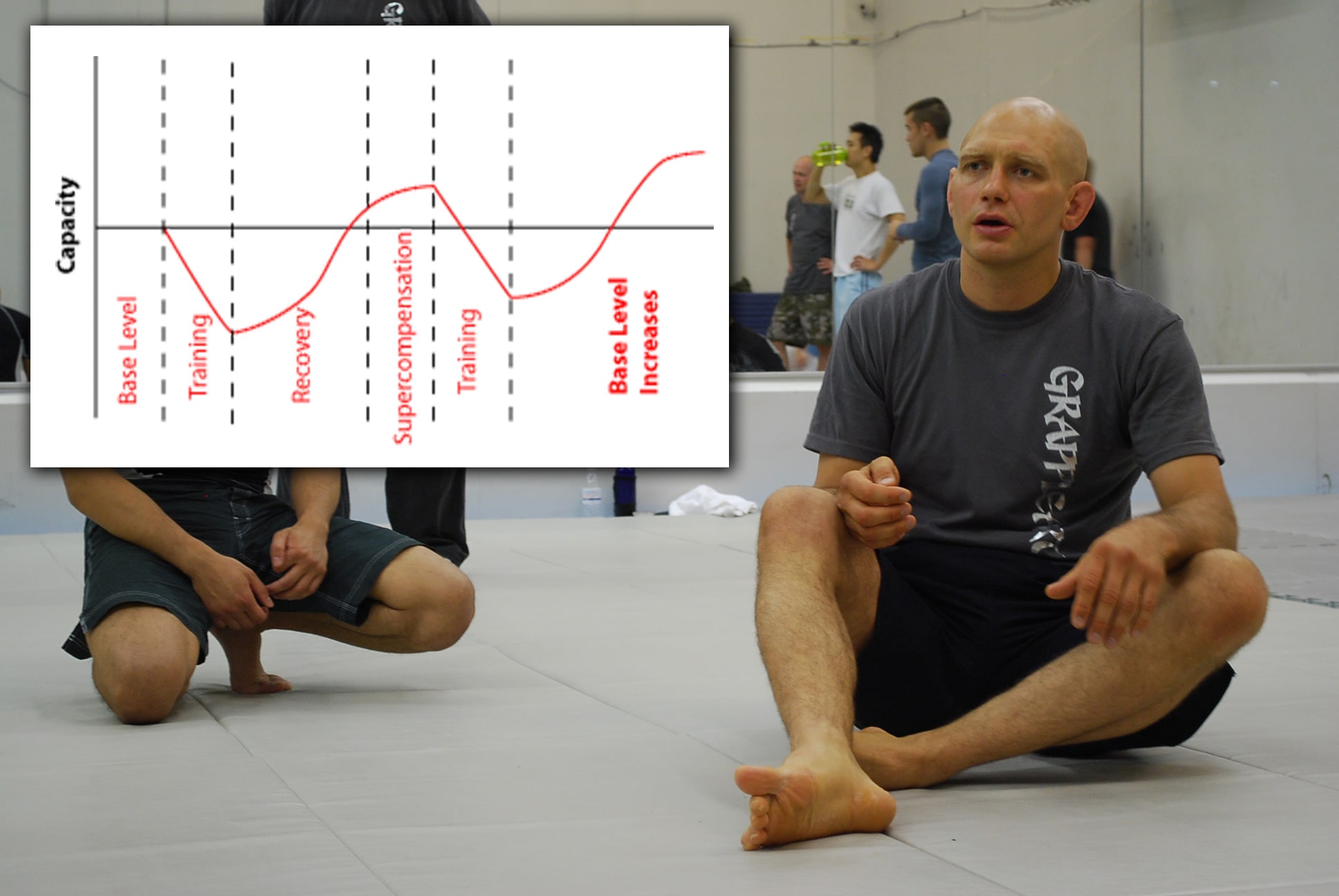
Your health is like a credit card..
You can definitely put things onto your credit card once in a while. You can even use a credit card to help bridge the gap when you’re short on funds. But sooner or later you need to pay it off.
But if you keep on making withdrawals against your card without ever putting money back into it then you’re going to end up in serious trouble.
Your health is the same way. You can’t borrow against it indefinitely.
If you keep asking your body to push hard without giving it the time and support to recover then things are eventually going to go catastrophically wrong.
Now of course you can push the envelope of your physical ability from time to time. You can (and should) occasionally test your limits because doing difficult things can be a profoundly transformative experience.
But after beating the crap out of your body you need to balance the books by giving it the opportunity to recover.
Hard training without quality recovery is a recipe for disaster.
Listen to my Podcast Episode on Recovery from Training Here
If you prefer, you can listen to me talk about recovery on my podcast (The Strenuous Life Podcast) in audio only format.
It’s episode 312 and you can listen to it pretty much anywhere that podcasts are streamed, including the following apps:
If you don’t have a preferred podcast player you can can listen on the Grapplearts BJJ Master App which you can download for free for iPhone and iPad in the Apple App Store here or for Android devices in the Google Play Store here.
Or you can stream the audio in the embedded player here…
Strain, Recovery, Overtraining and Supercompensation
To understand the importance of recovery let’s talk about stress, recovery, supercompensation and overtraining…
Optimal health is a balance between putting strain on your body and then allowing it to recover in order to get all those adaptive benefits.
Overtraining is breaking your body down faster than you can recover from it (click here for a detailed discussion of overtraining).
Let’s start with a regular training and recovery cycle which looks something like this:
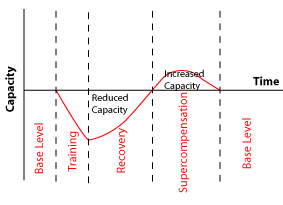 Training, recovery, and supercompensation stages
Training, recovery, and supercompensation stages
(from my Overtraining in the Martial Arts article)
Note that your capacity to do work actually decreases right after a workout. Think of it this way: you’re unlikely to set your bench press record at the end of a hard chest and triceps workout because those muscles are tired, right?
It’s not until after you recover from your workout that your ability to work hard actually improves for a while (the supercompensation period), and then fades away again.
Now if you get the timing right and have an optimal mix of training and recovery then your overall work capacity will gradually increase over time.
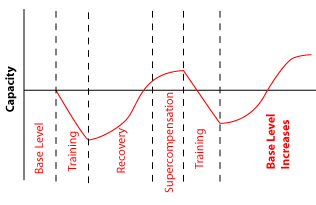
Gradual increase of athletic baseline capacity in response to training, recovery and supercompensation.
But if the recovery period is too short, or the training too severe, then you get overtraining. Overtraining inevitably leads to a decline in work capacity, illness and injury.
Stress on the body is good, but stress without recovery is bad.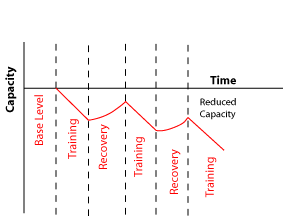
Insufficient recovery leading to decreasing performance and health.
Certainly there are times when you have to put your health on the backburner for a while because life can sometimes present us with situations where either the level of stress is too high, or the amount of recovery is too low. For example…
- Maybe you’re in an intense training camp getting ready for a competition,
- Or maybe you’re cramming for some sort of an exam and you’re only able to get a few hours of sleep a night,
- Or maybe you’ve got massive deadlines at your day job and can’t train at all,
- Or maybe you’ve got a newborn infant in the house and an uninterrupted night’s sleep is just a distant memory,
- Or maybe you’re on a wilderness trip trying to make an extraction deadline.
For myself there were times that I was getting ready for a competition, or trying to complete a difficult arctic solo canoe trip, where I was in deficit for very long periods of time.
I was racking up a hefty negative balance on my health credit card and rolling the dice on the injury front. There was just no way around it.
But just because you can maintain a frenetic pace for a short time doesn’t mean that it’s sustainable for the long term.
So make sure that these situations are TEMPORARY. Commit yourself to either reducing the physical toll on your body, or vastly improving the amount of recovery you’re getting, as soon as possible.
After all, you can’t keep putting things on your credit card forever…
Improving Your Recovery
I think most people reading this will understand how to train hard. To help with that I’ve written hundreds of articles about how to drill, spar, and do conditioning, all of which grind you into the ground.
But to become a black belt in jiu-jitsu you need to get good at the art of recovery as well.
Here are the three main ways to improve your recovery….
1, IMPROVE YOUR SLEEP
 20 years ago I read a book called “The Sleep Thieves” by Dr. Stanley Coren and it changed the way I trained or, more accurately, recovered from training.
20 years ago I read a book called “The Sleep Thieves” by Dr. Stanley Coren and it changed the way I trained or, more accurately, recovered from training.
Basically I immediately started to sleep more.
The book pointed out that just about every measurable aspect of physical and mental performance improves as you get better sleep. This has been verified by countless scientific studies and Olympic gold medals.
So in my world the number one thing for recovery is sleep. It’s been said that “The first part of training is sleeping“and it’s true for every sport on the planet.
To optimize your recovery you need to make sure that you’ve got to work on both 1) sleep quantity and 2) sleep quality
Some people need 7 hours of sleep a night, others need 9 or 10. Typically the more strain you put on your body then the more sleep you’ll need. Many high level athletes sleep 9 or 10 hours a night AND then also take a nap in the afternoon.
As important as sleep quantity is sleep quality.
By now most people know what they should be doing to improve the quality of their sleep.
- Keep your bedroom dark as a tomb
- Don’t shift your bedtime by more than an hour
- Avoid blue light from computer and phone screens for an hour before bed
- Give yourself wind-down time between running around and getting horizontal
- Don’t take caffeine and other stimulants after 1 pm
Take you sleep seriously and your training will thank you.
2, IMPROVE YOUR NUTRITION
Training involves tearing your body down, and nutrition is how you give your body the building blocks it needs to repair itself.
The problem is that nutrition is a complicated and controversial. Every guru has his or her proprietary diet that is supposedly so much better than all other diets.
I have written about nutrition for grapplers here, but the 5 biggest takeaways are…
- Avoid sugar as much as possible, except possibly immediately pre-workout
- Drink LOTS of water – up to 4 litres a day if you’re working out hard
- Eat more colorful vegetables, always
- Post-workout meals consumed soon after training are really important for replenishing your body
- Most supplements are garbage, but maybe take a basic vitamin and mineral supplement
When it comes to food, just like computer programming, it really is a garbage in, garbage out kind of situation. So put down the Big Mac and pick up the veggie sticks.
Take the same discipline you use for training and apply it to your meal planning; you’ll see an immediate difference in your body and on the mats.
3, AVOID AND REHAB INJURIES
Injuries are the enemy. So learning how to prevent, work around, and heal up from injuries is essential for optimising your recovery and making progress.
Obviously the best way to deal with injuries is to prevent them in the first place. So tap before you snap. Lift weights to increase your body’s reslience. Don’t roll with ‘that guy‘ who’s always hurting people. Train the more dangerous submissions with caution. Tap out early and tap out often. Don’t aggravate pre-existing injuries.
Learn how to do your own rehab but if that doesn’t work then seek expert advice from physiotherapists, massage therapists, doctors, and specialists. Don’t stop looking until you find a treatment modality that can help your injury.
Learn which injuries you can work through and which you can’t. A rib injury is different from a shoulder injury is different from a back injury is different from a neck injury.
If worst comes to worst and you have to take time off to heal up then try to maintain your fitness somehow and keep your head in the game.
There’s a lot of fun stuff in BJJ: cool sweeps, sexy submissions, and highly satisfying guard passes. But to excel you also need to get good at the non-glamorous aspects of the art like mastering your sleep, dialing in your nutrition, and becoming a black belt at preventing and healing from injuries.
Good luck with your training,
Stephan Kesting
DID YOU LIKE THIS? GET MORE EMAILED TO YOU
If you sign up for my email newsletter I’ll send you more tips covering techniques, training methods, and mindset hacks for BJJ.
The best part? It’s absolutely free, and you can easily unsubscribe with a single click if you don’t like what you’re getting.
Enter your best email below to check it out for free…

